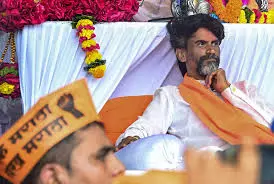Quota Chaos: Maratha Protest Roars Back, Sparking Celebrations and Court Condemnation

Maratha quota activist Manoj Jarange recently intensified his agitation, issuing a stern warning to the Maharashtra government regarding the demand for reservation under the Other Backward Classes (OBC) category. Jarange, who staged an indefinite fast at Azad Maidan in South Mumbai, insisted that if the Maratha community was not granted reservation, members from across Maharashtra would join the protest by the following weekend. He further escalated his agitation by refusing to consume water, beginning on Monday, as the deadlock showed no signs of resolution.
Jarange's core demand centered on the immediate issuance of Kunbi caste certificates to all Marathas, which would make them eligible for OBC reservation benefits. He accused the Mahayuti government, led by Chief Minister Devendra Fadnavis, of ignoring the community's demands and asserted his unwillingness to grant them additional time. Jarange warned of severe political repercussions, stating, “If Marathas withdraw support from the Mahayuti, not even a gram panchayat member from their alliance will get elected,” emphasizing the community's significant influence in upcoming village and municipal elections.
In response to the escalating protests, a cabinet sub-committee on Maratha reservation, headed by senior minister Radhakrishna Vikhe-Patil, convened a crucial meeting. The discussions involved Maharashtra’s Advocate General Biren Saraf, retired High Court judge Sandeep Shinde, and other committee members, focusing on the legal feasibility of implementing historical documents like the Hyderabad and Satara gazetteers to support the classification of Marathas as Kunbis. Vikhe-Patil acknowledged the complexities, noting a Supreme Court observation that Marathas and Kunbis are not identical, and requested more time to study the matter further, though remaining open to finding a solution.
Amidst the ongoing protest, the Bombay High Court strongly criticized the Maharashtra government for its failure to manage the situation at Azad Maidan, where thousands of Jarange's supporters had gathered, causing significant public inconvenience by blocking roads and railway stations in Mumbai. A bench of Acting Chief Justice S.V. Chandrashekhar and Justice Aarti Sathe questioned the State's reliance on Jarange’s influence to disperse crowds, instead of enforcing court orders to vacate the protest site forcefully. The court expressed displeasure over the widespread disruption and warned of taking action against the government for non-compliance, also indicating that Jarange could be held responsible for instigating crowds beyond permitted limits. Following the court's ultimatum, Jarange appealed to his supporters to respect the order, leading to many clearing roads and the CSMT railway station.
Ultimately, the agitation culminated in a significant breakthrough. Manoj Jarange ended his five-day fast after the Maharashtra government accepted most of his demands, including the crucial step of granting eligible Marathas Kunbi caste certificates. This decision was met with widespread jubilation, particularly in Antarwali Sarati village in Jalna district, which has served as the movement's epicenter for the past two years. Supporters celebrated this
You may also like...
Culture Shift at Nottingham Forest: Nuno Sacked, Ex-Australia Coach Set to Take Reins!

Nottingham Forest has dramatically shifted its managerial direction, sacking Nuno Espirito Santo, who led them to Europe...
Super Eagles' World Cup Dreams on the Line: Osimhen Injury, Mokoena Controversy Mar South Africa Showdown!

Nigeria's Super Eagles face a do-or-die World Cup qualifier against South Africa, complicated by star striker Victor Osi...
Emmy Glory: Creative Arts Awards Crown 'Severance,' 'The Penguin,' and 'SNL50' with Major Wins

The Creative Arts Emmy Awards celebrated outstanding achievements in television, with Apple TV+'s "The Studio" and HBO M...
Horror Sensation: 'The Conjuring: Last Rites' Unleashes Global Box Office Terror and Spine-Tingling Reviews

“The Conjuring: Last Rites” delivers a record-breaking global box office debut, cementing its place as the highest-gross...
African Music Crowns Its Best: Burna Boy, Davido Lead Star-Studded AFRIMA 2025 Nominations!

The 2025 All Africa Music Awards (AFRIMA) unveil a record-breaking nominations list, with Nigerian superstars Burna Boy ...
Blockbuster Showdown: 2025 MTV VMAs Reveals Performers, Presenters, and Shocking Winners List!

The 2025 MTV Video Music Awards, hosted by LL COOL J, celebrated music's biggest stars with Lady Gaga dominating the nig...
Oasis Reunion Chaos: Watchdog Threats, Line-Up Drama, and Escalating Feuds Plague Iconic Band's Return

Oasis is embarking on a highly anticipated reunion tour in 2025, with Andy Bell confirming his return to the band's line...
Explosive Allegations Rock Alexander Brothers: Accusers Detail Assaults as Lawyers Deny Claims

Luxury real estate moguls Oren, Alon, and Tal Alexander are accused by over 60 victims of rape and sexual assault, with ...